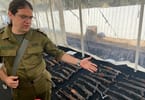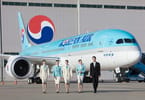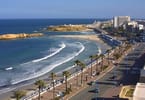Anyone vacationing in Israel this week won’t be able to miss them Whether you’re walking in Jerusalem, driving on the highway to Tel Aviv, arriving at Ben Gurion Airport, or surfing the internet, the logo and advertisements for the 2013 Maccabiah — opening ceremony next Thursday in Jerusalem — are everywhere.
“Sound Jewish minds in healthy Jewish bodies,” proclaims the 2013 Maccabiah slogan on a poster exclaiming “Higher! Faster! Stronger!” outside Ramat Gan. And it’s that combination of Jewish identity and the aspiration to world-class standards that drives what is arguably the third largest sporting event in the world.
Participants and supporters from over 70 countries are converging on Israel for this, the 19th Maccabiah, which kicks off July 18. They have come from large countries with prosperous Jewish communities such as Australia, Brazil, and the US, and from small countries with minuscule Jewish populations and limited financial resources like Cuba and Guinea-Bissau.
There will be Olympic medalists and world champions competing alongside amateur athletes and community league players. Language barriers and cultural differences exist — but there is a common denominator, that Jewish identity, which generally overcomes the difficulties; once off the field, say previous participants, the competitive tension is replaced by a sense of family.
“The Maccabiah is the most important Jewish and Zionist event in the world,” Maccabiah chairman Amir Peled told the Times of Israel in a recent interview. “There is no Jewish-Zionist event in the world that comes close to doing what the Maccabiah does — reaching everyone, those who belong to a synagogue and those who don’t attend at all.”
In a world that has seen drastic changes since the Games were first held in 1932, notably including the founding of the State of Israel, some ask why holding such a large and expensive sporting event is important. Peled says that question is only asked by those who don’t really understand what the games are about. The core values of the games, “being Jewish and Zionist,” he states, “are as relevant as ever.”
Speaking in his office in the Maccabiah Village complex in Ramat Gan, the chairman says the ideology on which the games were founded is still vital. The posters on the walls show how the tournament has changed over the years but, Peled says, “the moral guidelines have remained.”
Most, but not all Jewish communities, are represented. Though there are tens of thousands of Jews still living in Iran, not a single one of them will take part. “There were direct and indirect talks about organizing an Iranian team,” Peled reveals, but refuses to add more information about how, when or where those talks took place, or why they failed. However, he notes, “there are teams from 20 countries which didn’t have a team at the last Maccabiah, including a delegation from Cuba.”
Peled says this Maccabiah is far larger than the previous one four years ago, itself the largest in history. He doesn’t know if it can grow much more, “even if we get an Iranian delegation.”
The chairman details the many problems facing those organizing the event, especially on the logistical side. “Though Israel has some facilities at the highest levels,” — including soccer stadiums recently renovated for the UEFA Under-21 Championships, and the Wingate Institute’s revamped Olympic swimming pool — “athletes need to travel all over the place” for their various events.
When Peled says “all over,” he means it: the ice hockey games will take place in Metulah, Israel’s northernmost town, on the Lebanese border, while individual events such as weightlifting will be hosted by Beersheba, the capital of the Negev desert (here’s the complete schedule). On the one hand, participants have to sleep relatively close to the locations for their events; on the other, where possible, they have to be “in the same complex as their friends, along with entertainment, food venues, and open spaces,” like an Olympic village.
Despite the fact that his office sits in what was built to achieve that goal, Peled knows the project completed ahead of the 1957 Fifth Maccabiah isn’t worthy of the title. “There is nothing remotely like an Olympic village in Israel,” he states.
Still, “we’re fulfilling, or almost fulfilling, all the potential Israel has when it comes to infrastructure — with the sporting facilities, hotels, buses and other facilities needed.”
One of the problems that Maccabiah organizers have had to deal with over the years is the relative apathy of Israel — and Israelis — toward the games. Peled believes this can be changed, and hopes this year marks a turning point. In some countries, there are 30 people competing for every spot on the Maccabiah team, he says. “In Israel, most people don’t even know it’s taking place.”
“The biggest reason Israelis aren’t connected [to the games] is that they feel they’ve fulfilled the Zionist dream… They don’t feel the need to take part in an event strengthening their Jewish or Zionist identities, which are a given,” he says. His goal, he adds, isn’t to change the way Israelis feel about those values, but rather to connect them to the competition.
Economic troubles in Europe have taken their toll on the Jewish communities
“We need the games to be more accessible,” Peled says. So tickets to most events are being given out, not sold; some events (including the half marathon and triathlon) will be open to the public; and broadcasting agreements were signed with Israeli sporting channels. “Israelis like watching quality sports and their national teams,” he states. “There will be no room at the pool during the swim events, or at the judo and gymnastic events,” he predicts, “because of the high level of competition.”
Another way of connecting Israelis to the games — and to the participants from overseas — is through the army. “The IDF will host athletes at bases throughout the country, and soldiers will teach them the basics of shooting and navigating in the field.” Also, he notes, there will be an “IDF day” during the games. “It’s a way of showing everyone, Israeli or not, that the IDF is the army of the Jewish people.”
For the overseas athletes, he says, the Maccabiah also provides “an opportunity to tour the country. When the teams arrive, they usually come a few days before the opening ceremony for pre-camp. During this time, they practice, bond, and see the sights — from the Yad Vashem [Holocaust Memorial] to the Dead Sea.”
“Hava Nagila” fan Aly Raisman will take her moves to primetime. (YouTube)
Jewish-American Olympic gymnast Aly Raisman is participating in the Maccabiah Games this July (photo credit: screen capture, YouTube)
During the tournament “participants are occupied 100 percent of the time. From morning to evening, they have a packed schedule,” Peled states. When not competing, “they tour, hike [and] meet with heads of the army, politicians. Almost every evening, there is a program available, either by age or by geographical location. There are also four major events” — opening and closing ceremonies, a gala night, and a youth gathering — “and home hospitality.”
Asked what he hopes participants will gain from all this programming, Peled says “Ahavat Yisrael” — the love of Israel. Does he mean land, people, or state? He smiles. “All of it. Ahavat Yisrael is either or all of those.”
The other side of the equation, he says, is connecting Israelis to sporting cultures from other countries. “There are sports which aren’t yet played in Israel, but could catch on,” he says, mentioning hockey, baseball and ultimate frisbee. “Look at rugby. No one here knew what it was, and, through the Maccabiah it became more popular.” [Israel has a national team competing at the European championships this summer.] “I hope Israeli society learns to appreciate such sporting events.”
Peled isn’t only the chairman of the Maccabiah, he’s also an avid fan. His father was one of the founders of the games and his daughter won medals in various swim heats. “Swimming,” is his answer when asked what event he doesn’t want to miss. “The new pool at Wingate should be packed with spectators.”
What matters is that Jewish athletes at the highest level are an essential part of the Maccabiah
Besides renting the sport facilities, accommodation, transport, and food need to be taken care of. Peled knows some teams come with their entire families and are accompanied by friends and fans, but he’s more concerned with the NIS 200 million (some $55 million) spent on athletes alone.
“There are 170,000 nights already paid for at hotels. 600,000 meals and one million water bottles have also been ordered,” he lists. Most of the costs are covered by the athletes and teams, who are requested to pay 80%. The remaining 20% are split between the Maccabi organization, the State of Israel, and commercial sponsors.
“This year there’s a serious [financial] problem” and many teams needed help raising funds, Peled says. “The economic troubles in Europe have taken their toll on the Jewish communities as well, and we’ve needed to put a lot of effort to make sure delegations from various countries could fly out.”
In addition to being a Jewish event, the Maccabiah is also — or maybe mainly — a major sporting competition. Over the years, world champions and Olympic gold medalists participated in the games. “This year we have many first class athletes involved,” Peled says. Some are competing, others are participating from the sidelines, but “they’re all taking an active part in the Maccabiah.”
Naming some of the athletes who will be at the Maccabiah after participating in the 2012 London Olympics, Peled mentions team USA gymnast Aly Raisman and swimmers Garrett Webber-Gale and Jason Lezak, as well as Australian sprinter Steven Solomon and Israeli gymnast Alex Shatilov.
“It doesn’t matter if they’re on the mat, in the pool, or taking part in the torch relay,” says Peled. “What matters is that Jewish athletes at the highest level are an essential part of the Maccabiah.”
WHAT TO TAKE AWAY FROM THIS ARTICLE:
- In a world that has seen drastic changes since the Games were first held in 1932, notably including the founding of the State of Israel, some ask why holding such a large and expensive sporting event is important.
- Anyone vacationing in Israel this week won’t be able to miss them Whether you're walking in Jerusalem, driving on the highway to Tel Aviv, arriving at Ben Gurion Airport, or surfing the internet, the logo and advertisements for the 2013 Maccabiah — opening ceremony next Thursday in Jerusalem — are everywhere.
- “The Maccabiah is the most important Jewish and Zionist event in the world,” Maccabiah chairman Amir Peled told the Times of Israel in a recent interview.






















